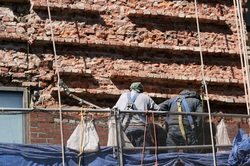So the soldiers, their officer, and the Jewish police arrested Jesus and bound him. First they took him to Annas, who was the father-in-law of Caiaphas, the high priest that year. Caiaphas was the one who had advised the Jews that it was better to have one person die for the people.  The unnamed disciple was known to the high priest and so they let him join Jesus for the questioning with Annas, the father of Caiphas. But that left Peter outside the gate and so the unnamed disciple talked to the woman guarding the gate and she let Peter into the courtyard. Not into the questioning room with Jesus, Annas and the unnamed disciple. But into the courtyard where the police who arrested Jesus were... and where this woman was. The one who let Peter in. The dialogue reads like the woman asked Peter if he was a disciple as she was opening the gate for him, "you're not one of his disciples too, are you?" A negative question, said in disbelief. I wonder if Peter didn't look like one of Jesus' disciples. What was a disciple of Jesus supposed to look like? Was Peter unlike the unnamed disciple in some way that made the woman (also unnamed) ask this question. I know we always focus on Peter's denial but I got hung up on the fire actually and that made me start thinking about the people around the fire. The guard (who is a woman and I'm really caught off guard by that fact), the police and now Peter. Blue collar folks out in the courtyard around a charcoal fire while the high priest's father does some preliminary hearing of Jesus and an unnamed disciple who belonged inside rather than outside. She asks, "You aren't you one of him, are you?" He says, "No." Slipping into her assumptions about him. But then the others around the fire ask too, all in the negative. All not believing he would be a follower of this person Jesus. He again uses their assumptions to deny who he has become. And a final question comes from the slave of the high priest, a relative of the one who Pete had cut his ear off... what are the odds? He says, "didn't I see you?" Again in the negative but more pointed, like he believes Peter is lying. Does Peter remember seeing this man in the garden? Does he wonder about the implications of lying here in the courtyard among this crowd? He denies again. I'm not who you think I am.  Meanwhile on this inside, Jesus is being asked who he is. Annas asks about his teaching and Jesus suggests he should've done more homework. His teachings are widely known and have been done in public. Annas should ask others what Jesus has taught. His response was considered disrespectful and a police told him so by striking him. Mind your manners. Who do you think you are talking like that to the high priest? Jesus says, If I am wrong. Testify to the wrong. He takes nothing back that he's said. He wants them to testify to what they hear. He wants a conversation. He wants to know what it is about him that they are arresting. He wants their prosecutorial argument. He puts the responsibility on the hearers. Testify, he tells them. And they say nothing. On the inside, they are being asked to speak their truth. On the outside, Peter is being asked to speak his truth. And Jesus is giving no answers. He's already spoken - in public, in the open. Now it is up to the hearers to do the speaking. What have they seen and heard? What have we seen and heard?
0 Comments
Now before the festival of the Passover, Jesus knew that his hour had come to depart from this world and go to the Father. Having loved his own who were in the world, he loved them to the end. The devil had already put it into the heart of Judas son of Simon Iscariot to betray him. And during supper Jesus, knowing that the Father had given all things into his hands, and that he had come from God and was going to God, got up from the table, took off his outer robe, and tied a towel around himself. Then he poured water into a basin and began to wash the disciples’ feet and to wipe them with the towel that was tied around him. He came to Simon Peter, who said to him, ‘Lord, are you going to wash my feet?’ Jesus answered, ‘You do not know now what I am doing, but later you will understand.’ Peter said to him, ‘You will never wash my feet.’ Jesus answered, ‘Unless I wash you, you have no share with me.’ Simon Peter said to him, ‘Lord, not my feet only but also my hands and my head!’ Jesus said to him, ‘One who has bathed does not need to wash, except for the feet, but is entirely clean. And you are clean, though not all of you.’ For he knew who was to betray him; for this reason he said, ‘Not all of you are clean.’ After he had washed their feet, had put on his robe, and had returned to the table, he said to them, ‘Do you know what I have done to you? You call me Teacher and Lord—and you are right, for that is what I am. So if I, your Lord and Teacher, have washed your feet, you also ought to wash one anothers' feet. For I have set you an example, that you also should do as I have done to you.  People that go unnoticed People that go unnoticed As research for her book Nickeled and Dimed, journalist Barbara Ehrenreich "left behind her middle class life as a journalist except for $1000 in start-up funds, a car and her laptop computer to try to sustain herself as a low-skilled worker for a month at a time. In 1999 and 2000, Ehrenreich worked as a waitress in Key West, Fla., as a cleaning woman and a nursing home aide in Portland, Maine, and in a Wal-Mart in Minneapolis, Minn. During the application process, she faced routine drug tests and spurious "personality tests"; once on the job, she endured constant surveillance and numbing harangues over infractions like serving a second roll and butter. Beset by transportation costs and high rents, she learned the tricks of the trade from her co-workers, some of whom sleep in their cars, and many of whom work when they're vexed by arthritis, back pain or worse, yet still manage small gestures of kindness." As I read Jesus' demonstration of service, I'm wondering about the servant whose job it was to wash their feet that evening. Where was she? Had Jesus given her the night off or was she off to the side watching Jesus do her job? Were the disciples also glancing up at with a sort of disdain that she had clearly taken too long to get to their feet that Jesus now was doing it. How inappropriate? In my mind, she could be the beautiful Latina woman, whose name I confess to have forgotten, who cares for the building in which I live. Or she could be one of the everyday waitresses at the diner I frequent, whose name is Terry. Or if the servant that evening was a man, he could be one of the nameless men who clean the inside of my car after I take it through the car wash. Or the young man at the gas station the other day who cleaned my windshield for me. I made sure to say thank you but I didn't think to ask his name.  Things that go unnoticed Things that go unnoticed I try to imagine Jesus, a Palestinian Jewish man in his early 30's caring for my building, or taking me and my friends' order for lunch on Thursday, or washing my windows while he pumps my gas. He took his robe off and took the role of a servant. And although we can say we don't have official servants anymore, let's be honest - of course we do. We just don't call them that. We pay below a living wage to a certain population to do tasks that we either don't want to do or don't have time to do or would simply make our lives easier. And I'm passing no judgment here, I'm simply walking into the text. The scene shows a group of people at a table depending on others to serve them at the table. Others will prepare the meal, serve the meal, wash their feet, clean up from the meal. Jesus chose to take one of those tasks from a servant. He upset the class system. And everyone in the room was provoked to evaluate their status in the room. And then when he was finished, he put his robe back on and took his seat at the table. Resetting the class system. And he asked them, "Do you know what I have done to you?" Before we go onto the final statements in the text, answer that question, "What does this do to us?" When we read this story and imagine Jesus upsetting the class system like this, What does it do to us? Yes, it teaches that I ought to serve one another. That I ought to figure out what washing feet means in my context. But on a very simple level, I believe Jesus has opened my eyes to the others in the room who are often nameless and perhaps even faceless... those who do not earn a livable wage and yet work two jobs. Now a certain man was ill, Lazarus of Bethany, the village of Mary and her sister Martha. Mary was the one who anointed the Lord with perfume and wiped his feet with her hair; her brother Lazarus was ill. So the sisters sent a message to Jesus, ‘Lord, he whom you love is ill.’ But when Jesus heard it, he said, ‘This illness does not lead to death; rather it is for God’s glory, so that the Son of God may be glorified through it.’ Accordingly, though Jesus loved Martha and her sister and Lazarus, after having heard that Lazarus was ill, he stayed two days longer in the place where he was. Then after this he said to the disciples, ‘Let us go to Judea again.’ The disciples said to him, ‘Rabbi, the Jews were just now trying to stone you, and are you going there again?’ Jesus answered, ‘Are there not twelve hours of daylight? Those who walk during the day do not stumble, because they see the light of this world. But those who walk at night stumble, because the light is not in them.’ After saying this, he told them, ‘Our friend Lazarus has fallen asleep, but I am going there to awaken him.’ The disciples said to him, ‘Lord, if he has fallen asleep, he will be all right.’ Jesus, however, had been speaking about his death, but they thought that he was referring merely to sleep. Then Jesus told them plainly, ‘Lazarus is dead. For your sake I am glad I was not there, so that you may believe. But let us go to him.’ Thomas, who was called the Twin, said to his fellow-disciples, ‘Let us also go, that we may die with him.’  Mary and Martha sent word to Jesus, "he whom you love is sick." Later in the gospel, the phrase "the disciple whom Jesus loved" is used six times:
I have always considered this one whom Jesus loved to be an archetype - one that could be me or you. What if we are the one whom Jesus loves? And what if we are sick? And what if those who love us here on earth have sent word to Jesus, "the one whom you love is sick?" And then what if Jesus lingers in coming to help us? And then we, like Lazarus, die. Illness wins. Our family grieves. The mourning commences. Spices and arrangements. Flowers and prayers. Crying and despair. Questions of why are kicked around while our friends and family mingle around tables set with finger food, cheese, crackers, brownie bites, hummus and carrots. Jesus didn't even make it to the funeral. Where is he? What could be more important than coming to our funeral? After all, he loved us. Everyone knew we had a special bond. Where was he? Why did we have to die? Life... liife is pain-filled, unpredictable, unsafe, fragile.  Friends of our parents who had come to the party begin to say their goodbyes and the crowd begins to thin. Our immediate family starts clearing the table. The conversation moves from small intimate discussions in the family room to silence in the kitchen while one sibling washes the dishes and the other dries the dishes. There is a new silence that has entered the room. It is the silence that has replaced your voice, my voice - in our absence. And our family can hear the silence, feel the silence as if it is our presence but they know it is not our presence. Our presence is gone. We are gone. We died. And Jesus didn't make it to the funeral. One sister says to another, "go check to see if we missed any dishes." And the other sister turns around, crosses the threshold of the door between the kitchen and the dining room. She hears the screen door open and shut around the corner in the living room. She takes a few more steps and sees Jesus. They lock eyes and she begins to cry all over again, saying "why weren't you here?" Why didn't you help? We needed you. We asked; we sent word. Where were you? Where have you been? This wouldn't have happened had you come earlier. She turns to get the other sister, still in the kitchen. Jesus has arrived. "Where?" In the living room. And with much more force, she asks the same questions... why? you loved him. if only... Does Jesus hug them? Does he console them? Does he try to offer a reason? It seems he says things we are taught not to say to the grieving like, "It'll be alright." "He's with God now." "He will be resurrected." Together they go to visit our grave site, newly covered with dirt. There is no headstone yet. It does not say here lies me or you, or Lazarus or the disciple whom Jesus loved. They stand around this buried friend and Jesus weeps. And then Jesus calls him out of the grave, wrapped in burial cloths and... we, Lazarus, the disciple whom Jesus loved resurrects. A lot happens between death and resurrection. In the same way I wish folks didn't miss the happenings of holy week, jumping from Palm Sunday to Easter, I don't want to rush in this story. I want to linger with the characters and sit with their feelings, their thoughts around death. I want to linger long enough to hear if Jesus has anything to say about the need for death. I want to imagine me as beloved, just like Lazarus, just like you. I want someone to send word to Jesus telling him that I am sick, that you are sick and I want to realize that Jesus would rather my sickness die than heal it in the now. Why would he rather that? Why does he prefer resurrection than healing? Because if he loves us, he certainly knows that we prefer healing. |
Search this blog for a specific text or story:
I am grateful for
|

This work is licensed under a Creative Commons Attribution-NonCommercial-ShareAlike 3.0 Unported License.
